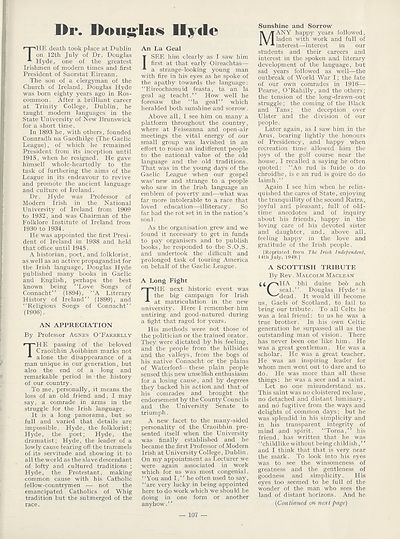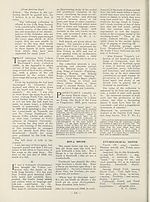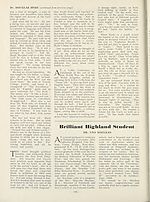An Comunn Gàidhealach Publications > Gaidheal > Volumes 44--45, January 1949--December 1950
(173) Page 107
Download files
Complete book:
Individual page:
Thumbnail gallery: Grid view | List view

Dr. Douglas Hyde
THE death took place at Dublin
on 12th July of Dr. Douglas
Hyde, one of the greatest
Irishmen of modern times and first
President of Saorstat Eireann.
The son of a clergyman of the
Church of Ireland, Douglas Hyde
was born eighty years ago in Ros¬
common. After a brilliant career
at Trinity College, Dublin, he
taught modern languages in the
State University of New Brunswick
for a short time.
In 1893 he, with others, founded
Connradh na Gaedhilge (The Gaelic
League), of which he remained
President from its inception until
1915, when he resigned. He gave
himself whole-heartedly to the
task of furthering the aims of the
League in its endeavour to revive
and promote the ancient language
and culture of Ireland.
Dr. Hyde was Professor of
Modern Irish in the National
University of Ireland from 1909
to 1932, and was Chairman of the
Folklore Institute of Ireland from
1930 to 1934.
He was appointed the first Presi¬
dent of Ireland in 1938 and held
that office until 1945.
A historian, poet, and folklorist,
as well as an active propagandist for
the Irish language, Douglas Hyde
published many books in Gaelic
and English, perhaps the best
known being “Love Songs of
Connacht’’ (1894), “A Literary
History of Ireland” (1899), and
“Religious Songs of Connacht”
(1906).
AN APPRECIATION
By Professor Agnes O’Farrelly
THE passing of the beloved
Craoibhin Aoibhinn marks not
alone the disappearance of a
man unique in our generation, but
also the end of a long and
remarkable period in - the history
of our country.
To me, personally, it means the
loss of an old friend and, I may
say, a comrade in arms in the
struggle for the Irish language.
It is a long panorama, but so
full and varied that details are
impossible. Hyde, the folklorist;
Hyde, the poet; Hyde, the
dramatist; Hyde, the leader of a
lowly cause tearing off the trammels
of its servitude and showing it to
all the world as the slave descendant
of lofty and cultured traditions ;
Hyde, the Protestant, making
common cause with his Catholic
fellow-countrymen — not the
emancipated Catholics of Whig
tradition but the submerged of the
race.
An La Geal
I SEE him clearly as 1 saw him
first at that early Oireachtas—
a strange-looking young man
with fire in his eyes as he spoke of
the apathy towards the language:
“Eireochamuid feasta, ta an la
geal ag teacht. ’ ’ How well he
foresaw the “la geal” which
heralded both sunshine and sorrow.
Above all, I see him on many a
platform throughout the country,
where at Feiseanna and open-air
meetings the vital energy of our
small group was lavished in an
effort to rouse an indifferent people
to the national value of the old
language and the old traditions.
That was in the young days of the
Gaelic League when our gospel
was' new and strange to a people
who saw in the Irish language an
emblem of poverty and-—what was
far more intolerable to a race that
loved education—illiteracy. So
far had the rot set in in the nation’s
soul.
As the organisation grew and we
found it necessary to get in funds
to pay organisers and to publish
books, he responded to the S.O.S.
and undertook the difficult and
prolonged task of touring America
on behalf of the Gaelic League.
A Long Fight
THE next historic event was
the big campaign for Irish
at matriculation in the new
university. Here I remember him
untiring and good-natured during
a fight that raged for years.
His methods were not those of
the politician or the trained orator.
They were dictated by his feeling,
and the people from the hillsides
and the valleys, from the bogs of
his native Connacht or the plains
of Waterford—these plain people
sensed this new unselfish enthusiasm
for a losing cause, and by degrees
they backed his actioa and that of
his comrades and brought the
endorsement by the County Councils
and the University Senate to
triumph.
A new facet to the many-sided
personality of the Craoibhin pre¬
sented itself when the University
was finally established and he
became the first Professor of Modern
Irish at University College, Dublin.
On my appointment as Lecturer we
were again associated in work
which for us was most congenial.
‘ ‘You and I, ” he often used to say,
“are very lucky in being appointed
here to do work which we should be
doing in one form or another
anyhow. ’ ’
Sunshine and Sorrow
MANY happy years followed,
laden with work and full of
interest—interest in our
students and their careers and
interest in the spoken and literary
development of the language, but
sad years followed as well—the
outbreak of World War I; the fate
of our own comrades in 1916—-
Pearse, O’Rahilly, and the others;
the tension of the long-drawn-out
struggle; the coming of the Black
and Tans; the deception over
Ulster and the division of our
people.
Later again, as I saw him in the
Arus, bearing lightly the honours
of Presidency, and happy when
recreation time allowed him the
joys of the golf course near the
house, I recalled a saying he often
quoted: “An rud is fuide o do
chroidhe, is e an rud is goire do do
Again I see him when he relin¬
quished the cares of State, enjoying
the tranquillity of the second Ratra,
joyful and pleasant, full of old-
time anecdotes and of inquiry
about his friends, happy in the
loving care of his devoted sister
and daughter, and, above all,
feeling happy in the love and
gratitude of the Irish people.
[Reprinted from The Irish Independent,
14th July, 1949.J
A SCOTTISH TRIBUTE
By Rev. Malcolm Maclean
4<y'-'iHA bhi duine beo ach
f seal.”. Douglas Hyde ‘ is
^“"''dead. It would ill become
us, Gaels of Scotland, to fail to
bring our tribute. To all Celts he
was a leal friend: to us he was a
true brother. In his own Celtic
generation he surpassed all as the
outstanding man of vision. There
has never been one like him. He
was a great gentleman. He was a
scholar. He was a great teacher.
He was an inspiring leader for
whom men went out to dare and to
do. He was more than all these
things: he was a seer and a saint.
Let no one misunderstand us.
This saint was no cloistered recluse,
no detached and distant luminary,
and no fugitive from the ways and
delights of common days; but he
was splendid in his simplicity and
in his transparent integrity of
mind and spirit. “Torna,” his
friend, has written that he was
‘‘childlike without being childish, ’ ’
and I think that that is very near
the mark. To look into his eyes
was to see the winsomeness of
greatness and the gentleness of
goodness and simplicity. His
eyes too seemed to be full of the
wonder of the man who sees the
land of distant horizons. And he
(Continued on next page)
— 107 —
THE death took place at Dublin
on 12th July of Dr. Douglas
Hyde, one of the greatest
Irishmen of modern times and first
President of Saorstat Eireann.
The son of a clergyman of the
Church of Ireland, Douglas Hyde
was born eighty years ago in Ros¬
common. After a brilliant career
at Trinity College, Dublin, he
taught modern languages in the
State University of New Brunswick
for a short time.
In 1893 he, with others, founded
Connradh na Gaedhilge (The Gaelic
League), of which he remained
President from its inception until
1915, when he resigned. He gave
himself whole-heartedly to the
task of furthering the aims of the
League in its endeavour to revive
and promote the ancient language
and culture of Ireland.
Dr. Hyde was Professor of
Modern Irish in the National
University of Ireland from 1909
to 1932, and was Chairman of the
Folklore Institute of Ireland from
1930 to 1934.
He was appointed the first Presi¬
dent of Ireland in 1938 and held
that office until 1945.
A historian, poet, and folklorist,
as well as an active propagandist for
the Irish language, Douglas Hyde
published many books in Gaelic
and English, perhaps the best
known being “Love Songs of
Connacht’’ (1894), “A Literary
History of Ireland” (1899), and
“Religious Songs of Connacht”
(1906).
AN APPRECIATION
By Professor Agnes O’Farrelly
THE passing of the beloved
Craoibhin Aoibhinn marks not
alone the disappearance of a
man unique in our generation, but
also the end of a long and
remarkable period in - the history
of our country.
To me, personally, it means the
loss of an old friend and, I may
say, a comrade in arms in the
struggle for the Irish language.
It is a long panorama, but so
full and varied that details are
impossible. Hyde, the folklorist;
Hyde, the poet; Hyde, the
dramatist; Hyde, the leader of a
lowly cause tearing off the trammels
of its servitude and showing it to
all the world as the slave descendant
of lofty and cultured traditions ;
Hyde, the Protestant, making
common cause with his Catholic
fellow-countrymen — not the
emancipated Catholics of Whig
tradition but the submerged of the
race.
An La Geal
I SEE him clearly as 1 saw him
first at that early Oireachtas—
a strange-looking young man
with fire in his eyes as he spoke of
the apathy towards the language:
“Eireochamuid feasta, ta an la
geal ag teacht. ’ ’ How well he
foresaw the “la geal” which
heralded both sunshine and sorrow.
Above all, I see him on many a
platform throughout the country,
where at Feiseanna and open-air
meetings the vital energy of our
small group was lavished in an
effort to rouse an indifferent people
to the national value of the old
language and the old traditions.
That was in the young days of the
Gaelic League when our gospel
was' new and strange to a people
who saw in the Irish language an
emblem of poverty and-—what was
far more intolerable to a race that
loved education—illiteracy. So
far had the rot set in in the nation’s
soul.
As the organisation grew and we
found it necessary to get in funds
to pay organisers and to publish
books, he responded to the S.O.S.
and undertook the difficult and
prolonged task of touring America
on behalf of the Gaelic League.
A Long Fight
THE next historic event was
the big campaign for Irish
at matriculation in the new
university. Here I remember him
untiring and good-natured during
a fight that raged for years.
His methods were not those of
the politician or the trained orator.
They were dictated by his feeling,
and the people from the hillsides
and the valleys, from the bogs of
his native Connacht or the plains
of Waterford—these plain people
sensed this new unselfish enthusiasm
for a losing cause, and by degrees
they backed his actioa and that of
his comrades and brought the
endorsement by the County Councils
and the University Senate to
triumph.
A new facet to the many-sided
personality of the Craoibhin pre¬
sented itself when the University
was finally established and he
became the first Professor of Modern
Irish at University College, Dublin.
On my appointment as Lecturer we
were again associated in work
which for us was most congenial.
‘ ‘You and I, ” he often used to say,
“are very lucky in being appointed
here to do work which we should be
doing in one form or another
anyhow. ’ ’
Sunshine and Sorrow
MANY happy years followed,
laden with work and full of
interest—interest in our
students and their careers and
interest in the spoken and literary
development of the language, but
sad years followed as well—the
outbreak of World War I; the fate
of our own comrades in 1916—-
Pearse, O’Rahilly, and the others;
the tension of the long-drawn-out
struggle; the coming of the Black
and Tans; the deception over
Ulster and the division of our
people.
Later again, as I saw him in the
Arus, bearing lightly the honours
of Presidency, and happy when
recreation time allowed him the
joys of the golf course near the
house, I recalled a saying he often
quoted: “An rud is fuide o do
chroidhe, is e an rud is goire do do
Again I see him when he relin¬
quished the cares of State, enjoying
the tranquillity of the second Ratra,
joyful and pleasant, full of old-
time anecdotes and of inquiry
about his friends, happy in the
loving care of his devoted sister
and daughter, and, above all,
feeling happy in the love and
gratitude of the Irish people.
[Reprinted from The Irish Independent,
14th July, 1949.J
A SCOTTISH TRIBUTE
By Rev. Malcolm Maclean
4<y'-'iHA bhi duine beo ach
f seal.”. Douglas Hyde ‘ is
^“"''dead. It would ill become
us, Gaels of Scotland, to fail to
bring our tribute. To all Celts he
was a leal friend: to us he was a
true brother. In his own Celtic
generation he surpassed all as the
outstanding man of vision. There
has never been one like him. He
was a great gentleman. He was a
scholar. He was a great teacher.
He was an inspiring leader for
whom men went out to dare and to
do. He was more than all these
things: he was a seer and a saint.
Let no one misunderstand us.
This saint was no cloistered recluse,
no detached and distant luminary,
and no fugitive from the ways and
delights of common days; but he
was splendid in his simplicity and
in his transparent integrity of
mind and spirit. “Torna,” his
friend, has written that he was
‘‘childlike without being childish, ’ ’
and I think that that is very near
the mark. To look into his eyes
was to see the winsomeness of
greatness and the gentleness of
goodness and simplicity. His
eyes too seemed to be full of the
wonder of the man who sees the
land of distant horizons. And he
(Continued on next page)
— 107 —
Set display mode to:
![]() Universal Viewer |
Universal Viewer | ![]() Mirador |
Large image | Transcription
Mirador |
Large image | Transcription
| An Comunn Gàidhealach > An Comunn Gàidhealach Publications > Gaidheal > Volumes 44--45, January 1949--December 1950 > (173) Page 107 |
|---|
| Permanent URL | https://digital.nls.uk/127124112 |
|---|
| Description | This contains items published by An Comunn, which are not specifically Mòd-related. It includes journals, annual reports and corporate documents, policy statements, educational resources and published plays and literature. It is arranged alphabetically by title. |
|---|
| Description | A collection of over 400 items published by An Comunn Gàidhealach, the organisation which promotes Gaelic language and culture and organises the Royal National Mòd. Dating from 1891 up to the present day, the collection includes journals and newspapers, annual reports, educational materials, national Mòd programmes, published Mòd literature and music. |
|---|---|
| Additional NLS resources: |
|

